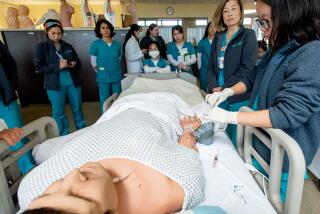USC Nursing School May Trim Programs
Hospitals straining under an extreme shortage of nurses now face another blow: USC is considering eliminating its undergraduate nursing program.
Administrators of hospitals throughout the region have responded with anger and disbelief that USC might drop undergraduate nurses’ training.
“We felt this was the wrong time to think about that,” said Jim Lott, executive vice president of the Health Care Assn. of Southern California. “We need more nursing slots and more nursing programs, not fewer.”
Although the number of registered nurses increased nationally by 5% last year, California has continued to lag behind other states with one of the worst nurse shortages in the nation. In 20 years, the state will be short 60,000 nurses, according to a January report issued by the UC San Francisco Center for the Health Professions.
Six schools in Los Angeles County offer a baccalaureate degree in nursing, but Lott said USC probably generates more registered nurses each year than any of the other five. (About 80 graduates from USC take the licensing exam each year, he said.) The university also has a reputation for producing well-prepared nurses with exceptional clinical training and for accepting applicants of diverse ethnicities, an issue that has been a persistent concern in a field in which minorities are underrepresented.
“I think it will be a tremendous loss to the nursing community and to patients,” said Glenda Canfield, a registered nurse and coordinator for the Service Employees International Union. “I don’t think it sends a positive message on resolving the nursing shortage.”
School officials said they will not make a final decision until next week, but USC stopped accepting freshman applications to the nursing school in January. The master’s program will remain intact.
“We do this every year . . . take a look at the university’s priorities,” said Joseph Hellige, vice provost for academic programs.
Hellige said many factors are under consideration, including the size of the program relative to its cost. He declined to comment further.
“They look at nursing as a very costly program,” said Gladys Smith, associate dean of nursing at Los Angeles Trade and Technical College. “They need to realize we are dealing with human beings.”
Lott said the university would be disregarding its responsibility to the community as a whole.
“USC, like many schools, is concerned about academic ratings. . . . When they look at certain programs, they look at the performance to see if the program is helping them or hurting them in the academic standings,” Lott said.
About six years ago, UCLA eliminated its undergraduate nursing program when the school’s budget was cut 33%, said Mary Woo, associate dean of research in the school of nursing, which is now a master’s program. The decision was mostly financial, she said, but there also was a question of whether undergraduate nursing should be taught at the university level.
“Whenever there is a tough time, the nursing programs are the ones that get put on the block,” said Suzanne Gordon, author of “Life Support: Three Nurses on the Front Lines.” “Schools look at this as vocational training. The graduate level has the impression of being knowledge-producing.”
The potential closing of the undergraduate program underscores concern among nurses that efforts to elevate the profession are backfiring on patients who need care at the bedside.
“The whole idea of nursing education should be that it benefits patients directly. Most of these graduate nursing programs produce nurses who leave bedside care at some point,” Gordon said.
Many more students want nursing degrees than can be accommodated in existing programs. National trends have shown an increase in the number of people entering the nursing profession with bachelor’s degrees; 17% did so in 1980, compared with 29% in 2000. If USC’s program is eliminated, students seeking undergraduate degrees will probably have to join waiting lists of six to 18 months at other schools.
“There are a lot more people interested in being nurses than we have the ability to educate,” Lott said. “There may be a break-even point, but we are not there yet.”
Last year, community colleges had to turn away more than 5,000 potential nursing students.
Rachel McDermott, a Santa Monica College student who planned to transfer to USC’s nursing program in the fall, said she was “dumbfounded when I found out that they would even think of canceling this program at this time.”
More to Read
Sign up for Essential California
The most important California stories and recommendations in your inbox every morning.
You may occasionally receive promotional content from the Los Angeles Times.










